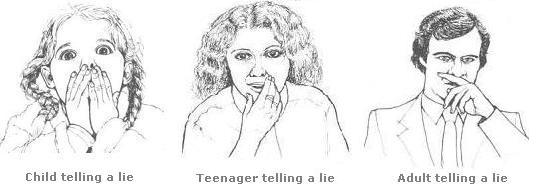The body language of lies

No matter how good anyone is at lying, the face always gives it away in subtle ways. The science behind body language, particularly when it comes to lying, can be complicated. But there are those verbal cues that ordinary people can use to tell when a spouse, friend, partner or relative is feeding them with a junk load of lies.
Fidgeting
In the body language of lying, fidgeting is a major sign. Especially to truthful people who know they are lying. According to Bella DePaulo, a body language expert, liars can tell one is lying even with just minimal fidgeting. We should watch out for this when we’re talking about something with someone close to us.
Eyes darting & rapid blinking
When someone feels uncomfortable or trapped by questions that they wish they didn’t have to answer, their eyes dart back and forth. This is the same thing that you’d do if you found yourself in a dangerous situation, trying to look for an escape route.
Rapid blinking is also another telltale body language sign that someone is lying. Typically, an average person blinks about 5 or 6 times each minute. However, when under stress (such as when they know they’re lying) this can go up to 30 times a minute.
Wrinkles beneath the eyes
When people authentically smile, little wrinkles appear around the eyes. But when the smile is false, it’s just done with the mouth and you won’t see any change in the eyes. This can help you figure out whether someone is just trying to be nice while in fact, they wish you weren’t there talking to them.
Behavioral pause
When you ask someone a question and get nothing, but then (after a delay) they begin to respond, this might be a telltale sign that they’re lying. An exception to this could be when you’re asking a question that needs thinking. For instance, if you ask your best friend where they were on this same day five years ago, they’ll most likely pause and try to remember. But if you ask them whether they robbed a store on this day five years ago, and they pause to think, then you probably need to pick your friends more wisely. It all depends on the context.
Verbal/non-verbal disconnects
Naturally, the brain is wired in such a way that it matches verbal and nonverbal behaviors. So when there’s a disconnection, this might be a sign that someone is telling a lie. An example of this is when someone nods affirmatively but says “no” or when he turns his head from side to side and says “yes”. However, keep in mind that this verbal/non-verbal disconnection only applies when there’s a narrative response, not short-phrased responses.
Hiding the mouth
Just like when people try to hide their darting eyes when they’ lying, hiding the mouth is also quite common. Naturally, people want to cover a lie. So if someone’s hand covers his or her mouth just when they’re responding to something, this is something you should definitely take note of.
Article Source: http://www.mentalizer.com/body-language-lies.html
Image Source: http://www.mentalizer.com/wp-content/uploads/2017/04/body-langauge-lies.jpg
VOCABULARY WORDS:
1. subtle (adj) - (especially of a change or distinction) so delicate or precise as to be difficult to analyze or describe
2. fidgeting (v - present participle) - make small movements, especially of the hands and feet, through nervousness or impatience
3. darting (v - present participle) - move or run somewhere suddenly or rapidly
4. telltale (adj) - revealing, indicating, or betraying something
5. authentically (adv) - undisputedly genuinely
QUESTIONS FOR DISCUSSION:
1. What are some reasons you lie?
2. Are you a good liar or a bad one? Why do you think so?
2. Among those listed in the article, which ones do you do when you lie?
4. Which ones do you notice other people do when they are lying?


